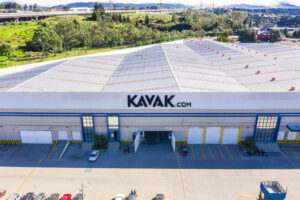
Por Daniela Dib
April 14, 2022
Just as in the 90s there was too much conversation around “the Web” and “doing things online”, we are now living in an era where the hottest buzzword are “Web3”, “DeFi” (decentralized finance, by its acronym in English) and “decentralization”.
But just like in the dot-com era, these new tech concepts are a source of general confusion and skepticism. Does Web3 really suggest a complete overhaul of how the Internet works or is it just a marketing ploy? What are the downsides of decentralizing financial services? How much can the NFT market still grow?
It’s still too early to answer these questions. These technologies are so new that it’s unclear which are just a fad and which really have the potential to radically transform our lives individually and collectively. Right now, it would be unwise to predict their success or failure –a bit like when, in 1999, a magazine declared that Amazon had already bombed.
However, there are some certainties that force us to view DeFi and Web3 as serious industries right now. First, they are attracting large investors. According to a report by Galaxy Digital Research, US$33 billion of VC money was invested in blockchain and DeFi startups worldwide in 2021. Some of the leading VC firms in America have announced important capital allocations in these nascent industries. See Andreessen Horowitz, which is raising its third crypto-focused fund, aiming at US$4.5 billion.
Second, Latin America has become a hotbed for new DeFi and Web3 companies. With abundant tech-skilled talent, a history of unreliable centralized institutions, and the disruptive startup culture that has boomed for at least a decade, the region is particularly positioned to be a disruptive lab for the next generation of Internet companies.
Plus, Latin America leads worldwide in terms of cryptocurrency adoption. These digital assets are key to decentralizing finance and stop depending on third parties (traditional banking institutions and regulators) to make transactions.
Before talking about the DeFi and Web3 companies worth watching in the region, a few notes:
Industry: Web3
Founders: Ari Meilich and Esteban Ordan
Backing: It launched its ICO in 2017. As of January 2020, it had raised US$25.5 million in three rounds.
Decentraland is a decentralized 3D virtual reality platform that runs on the Ethereum blockchain. It is a gateway to the metaverse, as users can create virtual structures like casinos, art galleries, concert halls, and theme parks, and charge a fee to virtual visitors. The platform uses its own cryptocurrency, MANA, which allows visitors to purchase digital parcels as NFTs and use them as virtual properties. Companies like Samsung, Adidas, Tommy Hilfiger and Sotheby’s have already participated in Decentraland, either by buying digital land or having some sort of brand activation on the platform.
Industry: DeFi
Founders: Camilo Cristia, Santos Barrios, Agustín Abraham and Joaquín Gómez
Backing: Pre-seed round led by Angel Ventures. Other investors included Primary Ventures of Grupo MATBA-ROFEX, the main derivatives market in Argentina.
Let’sBit is a cryptobank that uses the crypto world infrastructure, built on open blockchain protocols, to offer banking services like payments, transfers, loans and investments. The company wants to be a bridge between both traditional banking and crypto. “Our technology allows the bank accounts users already have in traditional banks to be used to transfer their money to crypto and begin to take better advantage of it in DeFi protocols,” Santos Barrios, Let’sBit co-founder and CTO, explained to Contxto.
Industry: Web3
Founders: Alex Ramírez and Hiram Altamirano
Backing: $600K after participating in 500 Latam
MisFans is becoming a tool for content creators (a very broad term that includes designers, writers, dancers, actors, artists, and countless other categories) to make a living from their creations. Instead of opting out of centralized social networks like YouTube, TikTok, Twitch, and Instagram, creators can add all their social profile links to their MisFans account and monetize from there. It’s a solution for the link-in-bio that wants to empower Internet creators without them depending on large companies –one of the key promises of Web3.
Industry: DeFi/Fintech
Founders: Borja Martel Seward and Marcelo Cavazzoli
Backing: A total of US$17.4 million in four investment rounds, the most recent a Series A in mid-2021.
Aside from being a platform to buy and sell cryptocurrencies like Bitcoin and ETH with Argentine pesos, Lemon is the country’s first virtual wallet to pay with both types of currencies (crypto and fiat). Lemon works as a bridge between the crypto world and traditional financial infrastructure to gradually incorporate crypto into day-to-day transactions. It gives 2% cashback in Bitcoin for each purchase, offers the Lemon Cash card to facilitate transactions, and offers Lemon Earn, which uses decentralized protocols to invest in different cryptos.
Industry: DeFi
Founder: Hernando Rubio
Backing: Its most recent round: a US$15 million Series B from Square and Hard Yaka.
Movii was created in 2018 in Colombia. It offers a digital wallet and a debit card linked to a payment system for merchants. Its payment system is authorized by Colombian regulators. It has also collaborated with national government-backed pilot programs to develop deposit and withdrawal services via a crypto asset exchange platform.
Industry: DeFi
Founders: Fernando Boiero and José Trajtenberg
Backing: US$1.1 million in 3 investment rounds. It’s also part of the Unicef Innovation Fund
Xcapit is a blockchain and A.I.-based solution wealth management tool for Latam focused on investments and good financial planning. Besides offering financial education courses and tools for planning financial goals, the Xcapit app allows users to save and invest using DeFi protocols. This is perhaps the most interesting part of the project, as it eliminates wealth managers as intermediaries and allows more people, even if they’re not financially savvy or have a bank account, to invest without worrying about fraud or mismanagement. Xcapit is described as a decentralized, open-source, custodial wallet.
You may also be interested: Web3 & DeFi, Enterprise SaaS, and Gaming Were The Most Attractive Industries For VCs in Q3: Report

Por Yanin Alfaro
February 17, 2026

Por Israel Pantaleón
February 17, 2026

Por Stiven Cartagena
February 13, 2026